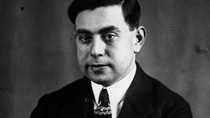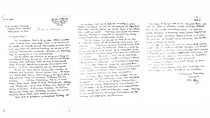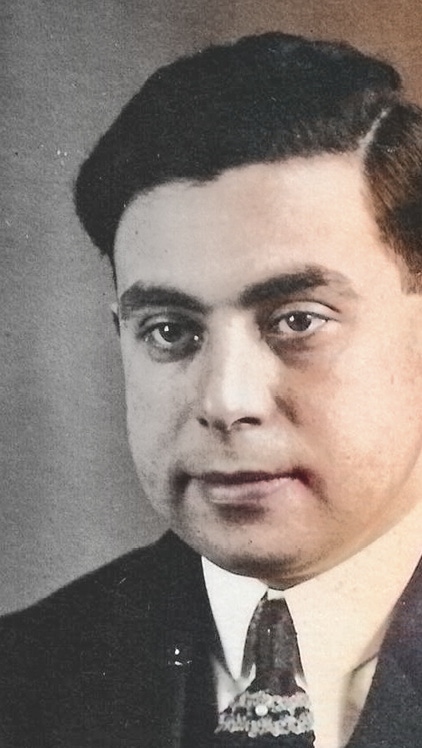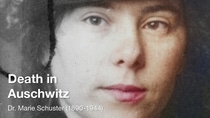Who we are
Dr. Berthold Stein - an odyssey to ruin

Lifetime: 1894-1956
Profession: Chemist
Employment at the plant: 1929-1938
Grounds for discrimination/persecution: Jewish [by faith]
Fate: Termination of employment; emigration
He was striving to leave Germany come what may, announced Dr. Berthold Stein as he entered into initial discussions with his employer in the summer of 1938 regarding his “non-Aryan descent.” [Nazi terminology] The chemist of Jewish faith, classified as “fully Jewish” under Nazi ideology, believed it impossible to “remain in Germany under the current conditions.”
“The nature of the country”
Forced to emigrate out of necessity, yet, from the point of view of I.G. Farben, somewhat voluntarily, he departed for the United States by December 1938 at the latest – the exact date is unknown. He acted conscientiously, wanting to be prepared before his wife and two sons joined him. Above all, during a stay of several weeks, he planned to determine “whether he can adapt to the nature of the country” and then look for a suitable position. In Ludwigshafen, Berthold Stein had worked in the Alizarin department since 1929, conducting research in the field of vat dyes.
I.G. Farben imposed a three-year waiting period on him, with associated compensation payments intended to facilitate a fresh start. That was the arrangement in theory, at least. It was at odds with the foreign exchange regulations in place at the time, which prevented large sums of money from being transferred to individuals residing abroad. Presumably believing he could secure his financial future early on, Berthold Stein also informed his employer of his further plans: “If Dr. Stein believes he cannot adjust to American living conditions, he plans to emigrate to Palestine, as transfer options for Jews are more favorable there.” This would later prove to be a misapprehension.
The invention-related compensation claims Berthold Stein made – he had been involved in filing around 70 patents – were supposed to be settled by a one-off payment of 20,000 RM. This was not a good solution in his eyes. He pointed out that he “would have to pay rather high income tax on the amounts he receives […] furthermore, he would also have to pay the Reich Flight Tax, including on the compensation payments he is to receive over the course of three years.” Berthold Stein also estimated the compensation claims for his inventions as significantly higher, believing he was entitled to 60,000 RM. However, the significantly lower offer remained.
“At his own request”
Berthold Stein probably realized early on that his emigration, intended to secure his family’s future – even their survival – would present a financial challenge. The promised payments would reach him abroad only in part or with significant deductions. In other areas, too, Berthold Stein endured setbacks and humiliations. In February 1939, he got his wife to criticize the wording of his employment reference. “Her husband took particular offense at the statement in the last paragraph of the final reference that he had left the company at his own request.” His former employer did not feel compelled to amend the reference accordingly.
Berthold Stein decided to return to Germany. His timing could not have been worse. Following the outbreak of the war, he was stranded in Marseille, France, and emigrated to Palestine on March 15, 1940. There, he initially lived with relatives in Tel Aviv, and later in Jerusalem. From the perspective of the German authorities, the move made Berthold Stein a foreign currency alien. The first consequence of this: Margarete Stein was informed that, without the approval of the foreign exchange office, I.G. Farben was no longer authorized “to make any payments to your husband – not even to you.” Through the approval of the foreign exchange transaction, the compensation payments owed to Berthold Stein were eventually paid out to his wife, who was still residing in Mannheim.
“Years of deprivation”
Margarete Stein and their younger son left Germany on September 7, 1940 on a flight to Moscow, before traveling on to Shanghai. Berthold Stein was completely unaware of this, having had no contact with his family for months. The older son had already emigrated alone to the United States in December 1939 – at the age of just 14. Years passed. It was not until the war ended that the Stein family was reunited in Jerusalem. In 1954, Berthold Stein described this reunion in a petition to BASF as the “greatest happiness” but had little else positive to report about his new life in “a country that is only just being established.” He was hardly able to build on his previous positions of employment and was working under worse conditions, he wrote. Not least out of a continued sense of loyalty to BASF, he had not accepted any offers from rival companies. He continued:
“The years since then have for me, or rather for us, always been years of deprivation, at times also of restriction. We have been unable to retain any of the possessions we previously worked for. All our household goods, books, etc., are gone, as are our savings. Nor did I receive the vast majority of the compensation paid at the time. Everything we now have in our very modest two-room apartment had to be purchased from our meager income, while faced by a generally very high cost of living.”

From September 1954, Berthold Stein received a monthly pension from BASF. He hoped that, now the family had been reunited, he would “now also have a material foundation at his disposal” that he had earned “years ago in Ludwigshafen.” It was a belated concession that did not benefit Berthold Stein for long; he died in December 1956 in Jerusalem. Margerete Stein returned to Mannheim alone.


